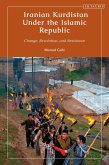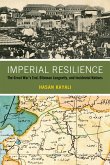Egypt's Muslim Brotherhood is today being pushed to the limits of its adaptability-and perhaps its utility. After a brief year in power, the organization's leaders now languish in prison or exile, while its followers face greater state repression than ever before.
Based on unprecedented access to Brotherhood leaders, rank-and-file members, and internal dissenters, this bold and creative study takes a new, granular view of the organization. The Brotherhood and its detractors alike have misunderstood it as a mass ideological organization, missing its evolution into an elite membership organization disconnected from its constituents.
In this Century International book, researchers Abdelrahman Ayyash, Amr ElAfifi, and Noha Ezzat argue that the Brotherhood is experiencing multiple crises-of identity, legitimacy, and membership-which accelerated after Egypt's military coup in July 2013. Through myriad stories and voices from within a fragmenting movement, the authors present a nuanced portrait of a once-formidable grassroots organization.
They argue that the Brotherhood has fallen out of touch with its animating ideas and popular following. But the same factors that have driven it to the margins today could catalyze a future revival. The fresh analysis in Broken Bonds: The Existential Crisis of Egypt's Muslim Brotherhood, 2013-22 will serve as a welcome corrective for policymakers, researchers, and all observers of Egyptian politics.
Based on unprecedented access to Brotherhood leaders, rank-and-file members, and internal dissenters, this bold and creative study takes a new, granular view of the organization. The Brotherhood and its detractors alike have misunderstood it as a mass ideological organization, missing its evolution into an elite membership organization disconnected from its constituents.
In this Century International book, researchers Abdelrahman Ayyash, Amr ElAfifi, and Noha Ezzat argue that the Brotherhood is experiencing multiple crises-of identity, legitimacy, and membership-which accelerated after Egypt's military coup in July 2013. Through myriad stories and voices from within a fragmenting movement, the authors present a nuanced portrait of a once-formidable grassroots organization.
They argue that the Brotherhood has fallen out of touch with its animating ideas and popular following. But the same factors that have driven it to the margins today could catalyze a future revival. The fresh analysis in Broken Bonds: The Existential Crisis of Egypt's Muslim Brotherhood, 2013-22 will serve as a welcome corrective for policymakers, researchers, and all observers of Egyptian politics.
Dieser Download kann aus rechtlichen Gründen nur mit Rechnungsadresse in A, D ausgeliefert werden.









